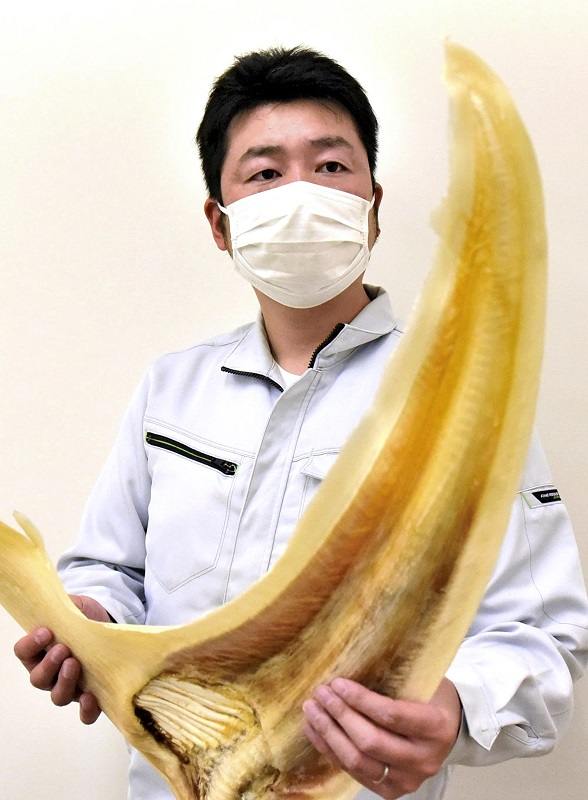
A blue shark caught by the Kesennuma ocean fishery cooperative
10:30 JST, September 11, 2022
KESENNUMA, Miyagi — It’s not just marine environments that change with the times. People’s sense of worth also changes.
Shark fishing has become a target for criticism in a society that emphasizes the Sustainable Development Goals. In the case of Kesennuma, Miyagi Prefecture, however, this criticism is off the mark.
At the Kesennuma fish market in late June, the sky began to brighten after 4 a.m. Skinny blue sharks bound in wire were lowered from a fishing boat. In the market, fishermen cut into salmon sharks with knives and removed their hearts, which are distributed as “mouka no hoshi,” literally meaning “stars of mouka,” to be eaten as sashimi. Mouka is another name for salmon sharks.
Sharks were originally a byproduct of tuna fishing. In Kesennuma, however, a major industry has been created out of sharks, using their meat and skin as well as processing the creature’s fins. In 2021, Kesennuma landed 9,144 tons of shark, more than the amount for tuna or sauries, and the city accounts for nearly half of Japan’s total shark catch.
But Kesennuma’s fishing industry is bearing into strong headwinds. According to the city’s ocean fishery cooperative, environmental groups have intensified calls to regulate shark fishing over the past 20 years.
Globally, there has been a problem with “finning,” in which only the shark’s fins are cut off and the still-living shark is dumped into the sea. The shark, without its fins, then dies.
“This criticism is not applicable in Kesennuma, where the whole shark is consumed,” said Kazuhiko Miura, 64, the cooperative’s executive director.
An increasing number of airlines have stopped shipping fins and hotels and restaurants have stopped cooking them because of environmental concerns, among other reasons. There are also moves to regulate the blue shark trade through international treaties, raising concerns that the shark market could shrink.
The cooperative has begun the process of obtaining certification from the Marine Stewardship Council, headquartered in Britain, for shark landings in Kesennuma.
Shark processors have also supported the industry by encouraging the consumption of parts of the shark besides the fins. Processed shark products range from minced fish cakes and shark nuggets to shark-skin jeans, shoes and collagen cosmetics and supplements.
Ishiwata Shoten, a shark fin processing company founded in 1957, is working to develop pet food from high-protein, low-fat shark meat, which is said to be a good fit for pets’ diets. The company will open a factory in Kesennuma this autumn after conducting research with a Tokyo-based company.

Hisashi Ishiwata, the third-generation president of Ishiwata Shoten, a company in Kesennuma, Miyagi Prefecture, is developing pet food from shark meat.
Related Tags
Top Articles in Features
-

Sapporo Snow Festival Opens with 210 Snow and Ice Sculptures at 3 Venues in Hokkaido, Features Huge Dogu
-

Tokyo’s New Record-Breaking Fountain Named ‘Tokyo Aqua Symphony’
-

Tourists Flock to Ice Dome Lodge at Resort in Hokkaido, Japan; Facility Invites Visitors to Sleep on Beds Made of Ice
-

High-Hydration Bread on the Rise, Seeing Increase in Specialty Shops, Recipe Searches
-

Heirs to Kyoto Talent: Craftsman Works to Keep Tradition of ‘Kinran’ Brocade Alive Through Initiatives, New Creations
JN ACCESS RANKING
-

Japan PM Takaichi’s Cabinet Resigns en Masse
-

Japan Institute to Use Domestic Commercial Optical Lattice Clock to Set Japan Standard Time
-

Israeli Ambassador to Japan Speaks about Japan’s Role in the Reconstruction of Gaza
-

Man Infected with Measles Reportedly Dined at Restaurant in Tokyo Station
-

Man Infected with Measles May Have Come in Contact with Many People in Tokyo, Went to Store, Restaurant Around When Symptoms Emerged























